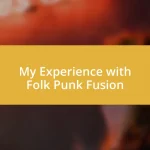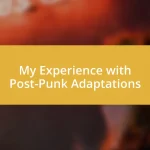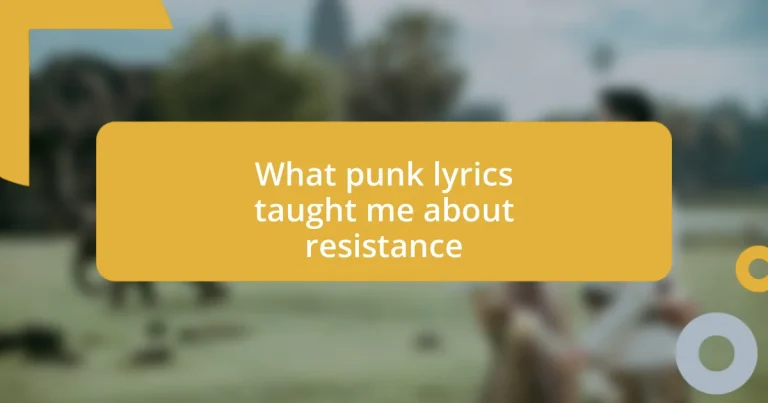Key takeaways:
- Punk lyrics serve as a powerful medium for expressing personal and collective frustration, fostering community and resilience among marginalized voices.
- The genre’s roots stem from a rebellious response to mainstream culture, intertwining music with political activism and a DIY ethos that emphasizes individuality.
- Key punk songs challenge societal norms and encourage listeners to confront uncomfortable truths, inspiring action and solidarity against injustice.
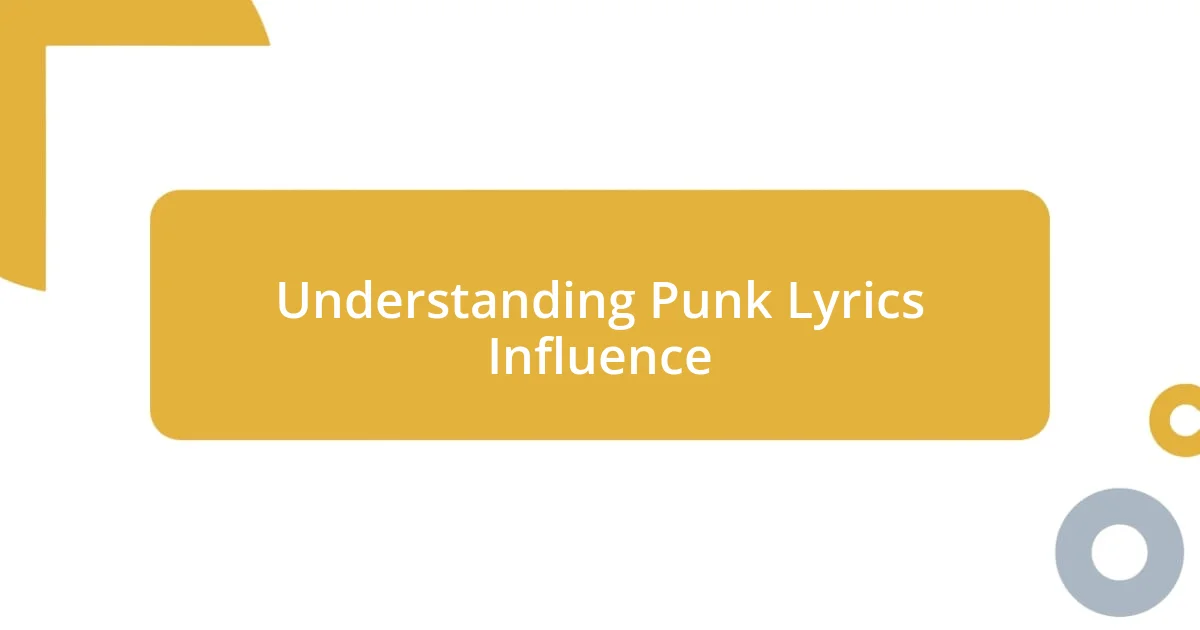
Understanding Punk Lyrics Influence
Punk lyrics are more than just catchy phrases; they’re a rebellion distilled into music. I remember the first time I heard a song that made me feel like I wasn’t alone in my frustrations. It struck me how these raw, unfiltered messages could resonate so deeply, prompting me to question the status quo—an awakening that many fans experience.
There’s something electrifying about the authenticity of punk lyrics. They often capture the chaos of life, addressing issues like inequality and disillusionment. For instance, I recall belting out lyrics during a particularly tough time in my life, finding solace in the shared angst. How often do we crave that sense of community? Punk fills that gap, providing a voice to those who feel unheard.
Exploring the influence of punk lyrics taught me that resistance is deeply personal. I find myself reflecting on how these songs, often filled with anger and defiance, sparked my own sense of agency. They remind us that it’s okay to stand up, to scream about injustices, and to push back against societal norms. Isn’t it empowering to realize that music can fuel our fight for change?
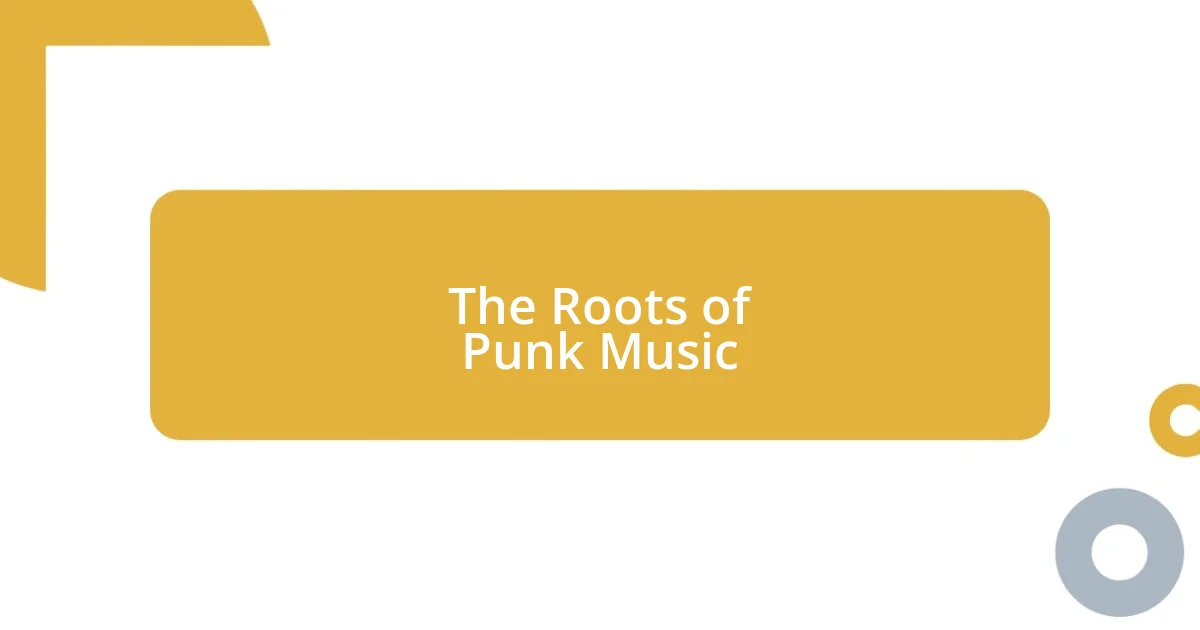
The Roots of Punk Music
Punk music roots can be traced back to various cultural and social movements of the late 1960s and early 1970s. The genre emerged as a response to the mainstream music culture, which many felt was overly commercialized and disconnected from the realities of everyday life. I distinctly remember flipping through old records at a thrift store, uncovering sounds that were raw and gritty, making me appreciate the DIY ethos that punk embodies.
There’s also a fascinating connection between punk and political activism. Bands like The Clash and Sex Pistols captured the frustrations of their time, addressing systemic issues and urging listeners to reflect on their own circumstances. The first time I witnessed a punk concert, the energy was palpable; it felt like a collective awakening, where people screamed for change together. Isn’t it remarkable how music can ignite such passionate responses?
As punk evolved, it became a platform for diverse voices and experiences. From its early days, it made room for discussions around identity, gender, and race, echoing the sentiments of marginalized communities. I remember attending local punk shows and being struck by the diversity of the crowd, uniting under one banner of rebellion and resistance against oppression. This sense of belonging is what makes punk enduring and vital even today.
| Key Components | Description |
|---|---|
| Social Commentary | Punk music reflects the frustrations of systemic issues and social injustice. |
| DIY Ethos | An emphasis on self-production and independent labels, promoting individuality. |
| Cultural Diversity | Incorporates voices from various backgrounds, enhancing its resistance narrative. |
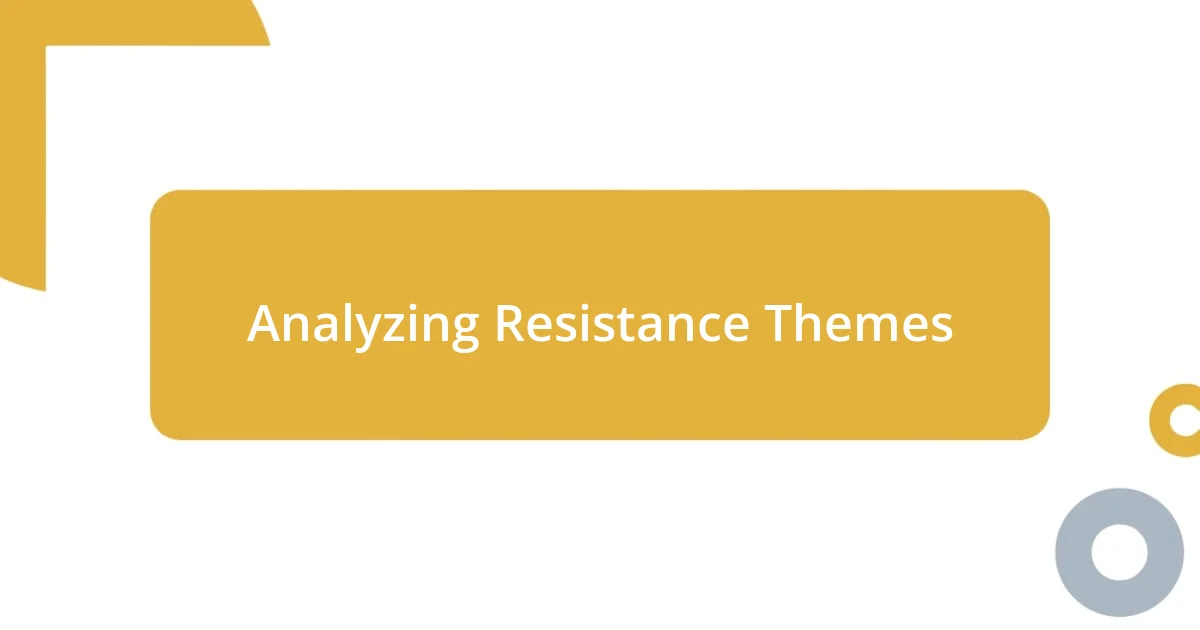
Analyzing Resistance Themes
When I dive into the lyrics of punk songs, I often notice a recurring theme of resilience in the face of adversity. It’s striking how many artists draw on their own experiences of struggle, weaving their personal battles into collective cries for change. For instance, I can’t forget listening to a track that echoed my own feelings of isolation during a tough period. It suddenly felt like I wasn’t just hearing music; I was absorbing a manifesto of defiance, an anthem that pushed me to confront my own challenges head-on.
Here are some common resistance themes that punk lyrics often explore:
- Empowerment through Anger: The raw emotion in punk gives voice to anger, turning it into a rallying cry for others to also take action.
- Rejection of Conformity: Many songs challenge societal norms, encouraging listeners to embrace their individuality and question prevalent ideologies.
- Solidarity in Struggle: Lyrics frequently highlight shared experiences, creating a sense of community among those who feel marginalized or oppressed.
In my experience, these themes play a crucial role in fostering a culture of resistance. It’s incredible how music can be a catalyst for change, transforming personal anguish into a powerful collective movement. Through punk, I’ve learned that opposition isn’t just an option; it’s a necessary component of growth and liberation.
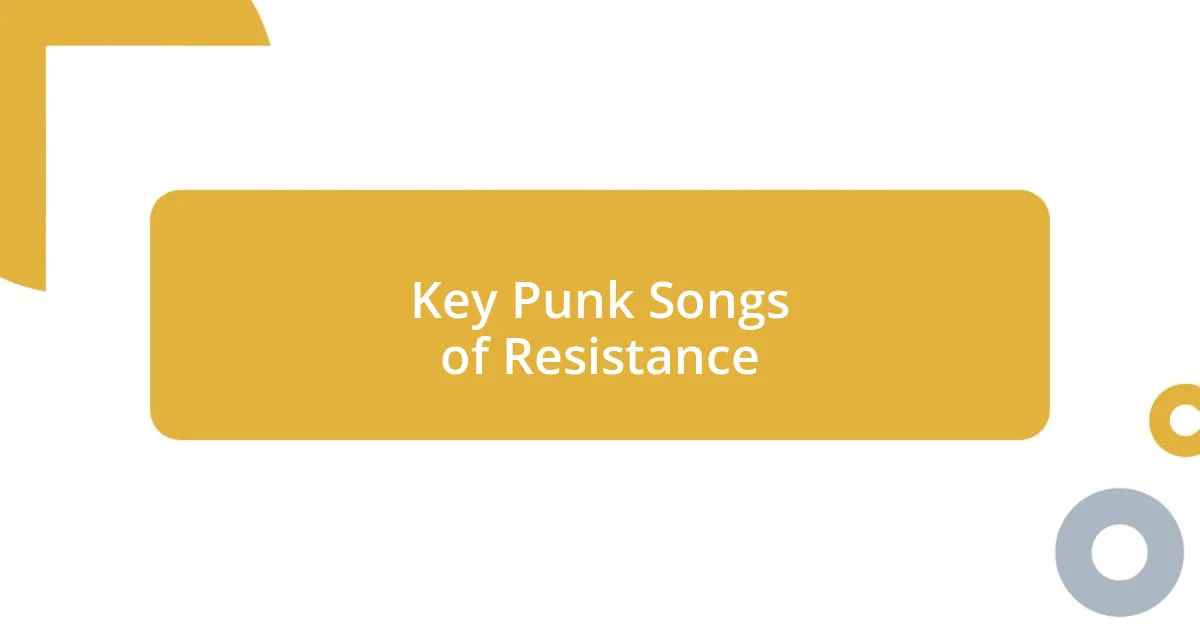
Key Punk Songs of Resistance
When I listen to “London Calling” by The Clash, I’m transported back to a time when social unrest was palpable. The way they boldly address issues like war and the struggles of the working class feels incredibly relevant, even today. It’s as if they are saying, “Wake up! Acknowledging our circumstances is the first step toward action.” There’s a raw energy in the song that inspires me to stand up and fight for what I believe in.
Another powerful anthem is “Holiday in the Sun” by the Sex Pistols. The lyrics act as a biting critique of consumerism and escapism, urging listeners to confront uncomfortable truths about society. Reflecting on my own life, I realized how easy it is to get lost in distractions rather than addressing the core issues around us. Have you ever felt that tug between enjoying your comforts and fighting for change? I certainly have, and that’s why this song resonates with me.
Lastly, listening to “Nazi Punks Fuck Off” by Dead Kennedys ignites a fierce sense of defiance within me. The message is straightforward and unapologetic: there’s no room for hate in our communities. I remember a local show where that song was performed live, and in that moment, it wasn’t just music; it was a collective assertion that intolerance has no place among us. It left me asking myself, “What am I doing to foster inclusivity in my own circles?” And in grappling with that question, I often find my passion for resistance renewed.
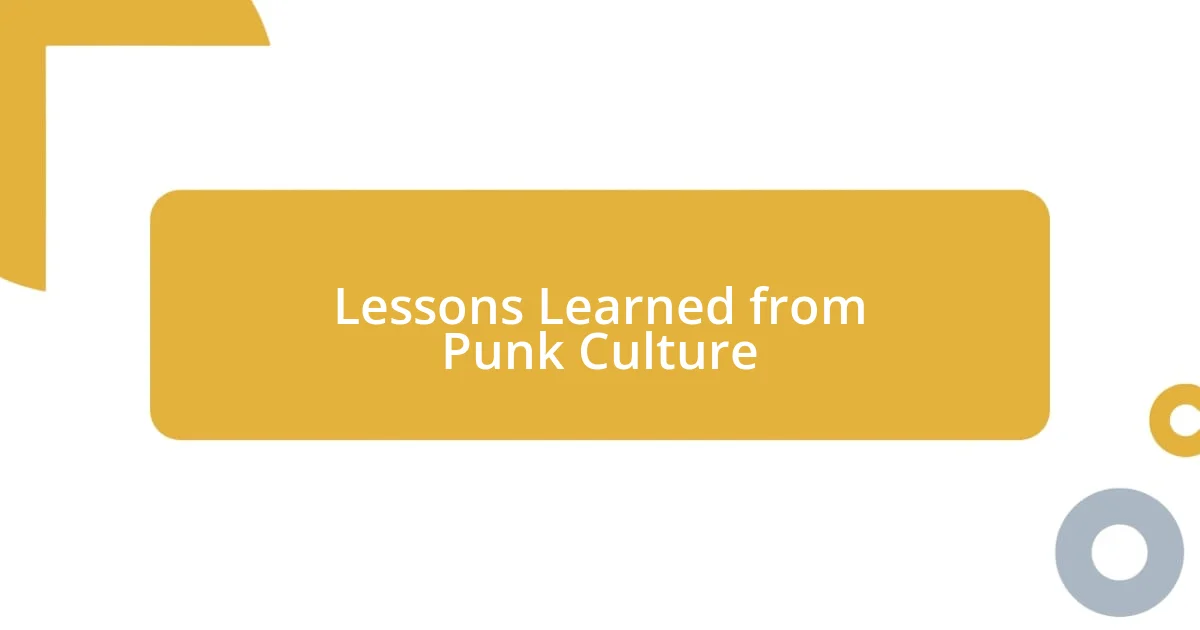
Lessons Learned from Punk Culture
Experiencing punk culture has taught me that our voices matter. I still remember the first time I screamed along to a punk anthem at a dive bar. It wasn’t just about the music—it was about reclaiming my space and my identity. That moment crystallized the lesson that resistance can be as much about personal assertion as it is about political activism.
Punk encourages a fearless questioning of norms, and I’ve found that this mindset has seeped into many facets of my life. I often ask myself: why do we accept things as they are? Engaging with punk has empowered me to challenge the status quo, whether it’s in my workplace or social circles. I feel an urgency to express dissent, particularly when conformity seems to stifle creativity and progress.
Moreover, punk fosters a sense of connection among those who feel marginalized. I recall a time when I attended a community gathering inspired by punk values, where people shared their stories of struggle. It was a raw and heartfelt exchange, reminding me that we are not alone in our fight. These shared experiences form a network of solidarity, giving us the strength to confront issues together. Isn’t it incredible how music can transform personal stories into a collective force for change?
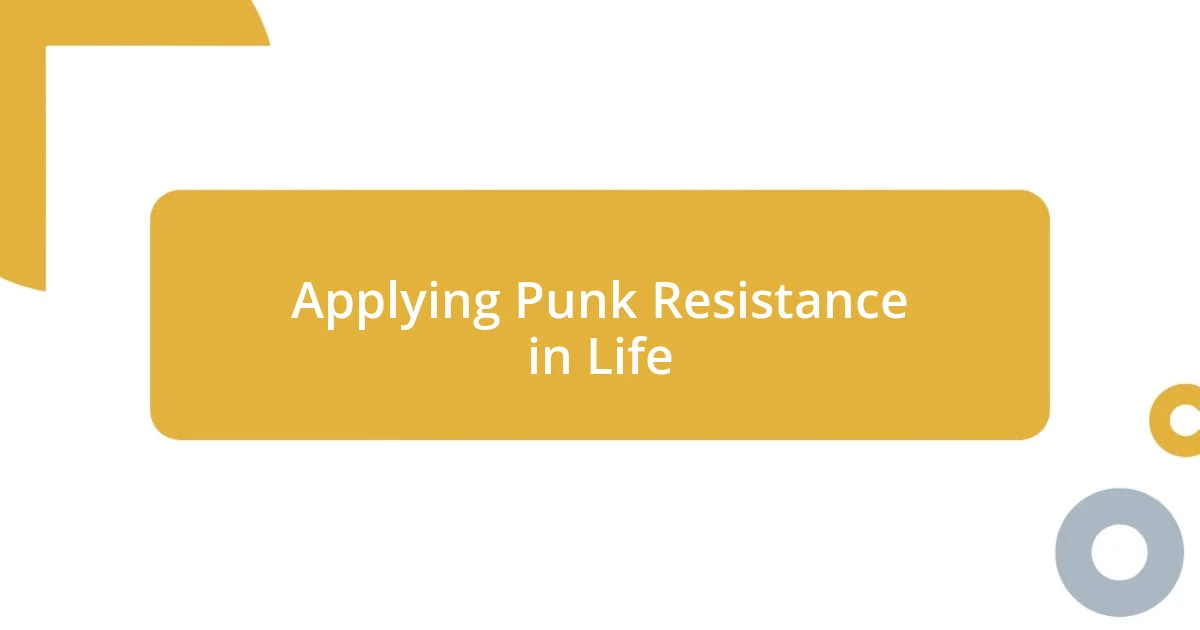
Applying Punk Resistance in Life
One of the most impactful lessons I’ve learned from punk resistance is the importance of standing firm in your beliefs. I can vividly recall a time when I was in a heated discussion about social justice at a friend’s party. Instead of shying away from the conversation, I channeled that punk energy to voice my thoughts passionately. It felt liberating to embrace my stance, even when others disagreed. Have you ever had that moment where you felt your voice breaking through the noise? It’s exhilarating, and it reminds us that our perspectives deserve to be heard.
Additionally, embracing the punk ethos means actively seeking out opportunities to challenge injustices around us. I recently volunteered at a grassroots organization advocating for underrepresented communities. The experience was eye-opening; it made me realize that resistance isn’t always loud—it can also be quiet, persistent, and community-driven. When did you last take a leap to support a cause you care about? For me, it was a reminder that every action, big or small, contributes to the greater fight against oppression.
Lastly, punk teaches us resilience in the face of adversity. There was a time when I faced ridicule for my unconventional views, particularly regarding environmental activism. Instead of retreating, I found strength in the punk principle of relentless perseverance. The ability to push back against negativity fueled my commitment to my beliefs. Have you faced pushback in your journey? If so, let those experiences reinforce your resolve. Punk reminds us that every challenge is an opportunity for growth and solidarity with fellow rebels.


